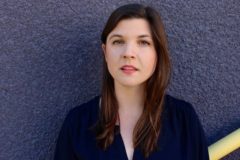Depicting Mandela
Nicole Murphy is an Australia-based composer and one of the featured artists of our forthcoming Flash Operas Program. Below are a collection of her thoughts about ‘Mandela Was Late,’ her short work based on the story by Peter Mehlman. Nicole will be in New York next week to attend EiO’s Flash Opera Workshop with the cast and orchestra for the production.
Mandela Was Late is based on a short story of the same title by author Peter Mehlman. The fictional story details the final meeting between Nelson Mandela and his parole officer after Mandela is freed from prison. The writing displays Mehlman’s dry wit, and highlights the tedium and redundancy of bureaucratic processes. My approach to transforming the short story into a libretto was to remain as close to the original text as possible, in order to maintain the integrity and comedic timing of the work. After all, it is unlikely that any attempt to rework the comedic set ups of a writer such as Mehlman (best known for his work as a writer on Seinfeld) would be an improvement. As someone who has a healthy scepticism of ‘red tape’ and bureaucracy, I was drawn to the farcical nature of the situation in Mehlman’s story. The parole officer is merely going through the motions, viewing Mandela as yet another criminal, tarring him with the same brush as every other criminal who passes through his office. He contemplates Mandela’s chance of reoffending, citing recidivism rates for criminals who have spent so long in prison to justify his thinking. And of course, it is absurd that Mandela must be processed in the same system as everyone else – no exceptions, one size fits all.

Score excerpt from ‘Mandela Was Late.’
Tedium is woven throughout the encounter. Initially the parole officer waits impatiently for Mandela to arrive. Once he arrives, the parole officer carries out the usual checks and searches. When he questions Mandela, the line of questioning is routine. I wanted to convey the monotony and tedium of the bureaucratic process in the score, which created a compositional challenge: Is it possible to convey a sense of monotony in music while still sustaining interest, creating contrast and generating forward momentum towards climactic moments? Another compositional challenge came in the form of the portrayal of Mandela. Representing a well-known figure is always somewhat of a challenge, and the distinctive nature of Mandela’s spoken voice was always in my ears as I wrote his lines.
When I initially read the text, there were a number of musical ideas that came to me. As I worked on the libretto I scribbled detailed notes of these ideas beside the text, sketched musical gestures on manuscript, and made a series of recordings of improvisations at the piano, while simultaneously commentating my orchestration ideas. The majority of these early ideas can be found in the completed score. During the upcoming workshop, I am most interested in exploiting the collaborative skill set of the creative team, singers and musicians in order to receive feedback to refine the piece. I am particularly interested in assessing the pacing of the opera in real time. Since comedic success is so often reliant on timing, I am curious to hear others’ opinions on the placement and timing of the text within the musical context.



